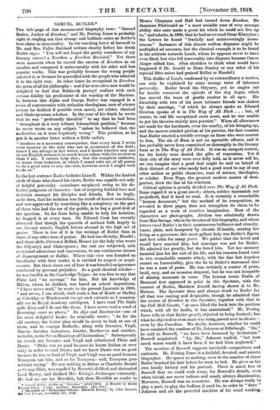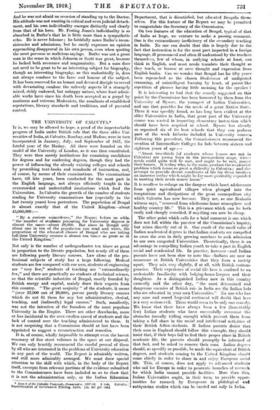SAMUEL BUTLER.*
TIM title-page of this monumental biography runs : " Samuel Butler, Author of Erewhon," and Mr. Festing Jones is probably right in singling out that strange and brilliant satire as Butler's
best claim to immortality. In the touching letter of farewell to Mr. and Mrs. Fuller Maitland written shortly before his death Butler says : " You will not forget the pretty roundness of my
literary career ! a Erewhon w Ereivlion Revisited." Yet there were moments when he cursed the success of Erewhon as an
incubus and compared it unfavourably with his other and less popular works. This was probably because the wrong people
admired it, or because he quarrelled with the people who admired It in the right way. At other times he recognized in Erewhon the germ of all his philosophy : and if he were alive now would be delighted to find that Bolshevik poetry j' realizes with such
curious fidelity his predictions of the worship of the Machine. In between this Alpha and Omega Butler was engaged in a series of controversies with orthodox theologians, men of science (whom he disliked if possible even more), art critics, classical and Shakespearean scholars. In the year of his death he wrote that he was " profoundly thankful" to say that he had been " throughout in a very solitary Ishmaelitish position," because he never wrote on any subject " unless he believed that the authorities on it were hopelessly wrong." This position, as he put it in another letter written a little earlier,
" involves as a necessary consequence, that every book I write runs counter to the men who are in possession of the field ; hence I am always in hot water, and I doubt whether any one of our English writers is in much worse odour with the reviewers than I am. I cannot help this ; but the complete isolation, or worse than isolation, in which I stand robs me of all power to do a good turn to any one else, however much I might wish to do so."
In the last sentence Butler belittles himself. Within the limited circle of those who shared his views, Butler was capable not only of helpful generosity—sometimes misplaced owing to his de- fective judgment of character—but of inspiring faithful love and devotion amongst his disciples and friends. But to imply,
as he does, that his isolation was the result of honest conviction, and was aggravated by something like a conspiracy on the part of those who had the ear of the public, is to beg a good deal of the question. So far from being unable to help his isolation, he hugged it at every turn. Sir Edward Cook has recently
observed that though the quarrels of authors bulk largely in our literary annals, English letters abound in the high art of praise. There is less of it in the writings of Butler than in those of any other man of genius. He had one divinity, Handel ; and three idols, Giovanni Bellini, Homer (or the lady who wrote the Odyssey), and Shakespeare ; the rest are subjected, with occasional admissions and concessions, to one continuous stream of disparagement or dislike. Where this view was founded on familiarity with their works, it is entitled to respect or acqui-
escence. But three times out of four it was founded on ignorance reinforced by personal prejudice. As a good classical scholar—
he was twelfth in the Cambridge Tripos—he was free to say that Plato had " no message " for him. But his knowledge of Milton, whom he disliked, was based on school impositions. " I have never read," he wrote to the present Laureate in 1900, " and never, I am afraid, shall read, a line of Keats or Shelley or Coleridge or Wordsworth except such extracts as I occasion-
ally see in Royal Academy catalogues. I have read The Idylls of The King and I do not like them. I have never read a word of Browning—save as above." In Alps and Sanctuariea--one of his most delightful books—he originally wrote : "As for the
old masters, the better plan would- be never to look at one of them, and to consign Raffaelle, along with Socrates, Virgil,
Marcus Aurelius Antoninus, Goethe, Beethoven and another, to limbo, as the Seven Humbugs of Christendom." Subsequently he struck out Socrates and Virgil and substituted Plato and Dante. "Blake was no good because ho learnt Italian at over sixty in order to read Dante, and we know Dante was no good because he was so fond of Virgil, and Virgil was no good because Tennyson ran him, and as for Tennyson—well, Tennyson goes without saying." He saw nothing in Balzac or Charlotte Bronte or George Eliot, was repelled by Rossetti, disliked and distrusted Lord Morley, and disliked Mrs. Ewing's Jackanapes extremely. He had no use for Meredith, but then Meredith as reader to • Said Butler, Attila? of "Erne/ion" (1835-1902). A Memoir by Henry Festing Jones. 2 vols. London : Macmillan. (428. net.) t gee article on " Proletarian Cniture : Boisevik Poetry," by John Courno, the New Europe, November 9th, 1919. Messrs. Chapman and Hall had turned down Erewhon. He dismisses FitzGerald as " a most amiable man of very average ability who once made a great hit which he could not live up to," and admits, in 1900, that he had never read Omar K.hayyairt
the Letters he found " fearfully and uninterestingly mono- tonous." Instances of this almost endless dispraise might be
multiplied ad nauseam, but the classical example is to be found in his attitude towards Lamb, whom he appears never to have even liked, but who fell irrevocably into disgrace because Canon Ainger edited him. (One shudders to think what would have happened if Dr. Arnold or Dean Stanley or any other of his especial bites noires had praised Bellini or Handel.}
This dislike of Lamb, confirmed by so extraordinary a motive, can only be explained by some strange twist of inhuman perversity. Butler loved the Odyssey, yet ho singles out for hostile comment the episode of the dog Argus, which has moved the tears of gentle readers in all ages. His friendship with two of his most intimate friends was shaken by their marriage, "of which he always spoke as Edward
Overton speaks of it in The Way of All Flesh . . . but, of course, in real life exceptional cases arose, and he was unable
to put his theories strictly into practice." When all allowances are made for the harshness, even the cruelty, of his bringing-up, and the narrow-minded pietism of his parents, the fact remains that Butler exacted a terrible revenge on those who were nearest to him. The sin of Hain is not an agreeable offence, and it has probably never been committed so thoroughly in the literary
form as in The Way of AU Flesh. It was an unequal contest, for his family were denied the gifts of expression. Yet if their side of the story were ever fully told, as it never will be,
we can imagine that a good deal might be said on behalf of their distrust of one who rarely had a good word to say of any other author or public character, man of science, theologian, or scholar. Even Pope, the greatest modern master of deni- gration, drew the line at his relations.
Critical opinion is greatly divided over The Way of All Flesh. Some regard it as a great novel ; others, neither squeamish nor prejudiced, find it hard to read. It is certainly a remarkable " human document," but the method of its composition, as revealed in these pages, does not strengthen its claim to be
regarded as a work of creative imagination. Most of the characters are photographs. Alethea was admittedly drawn from Miss Savage, who is the heroine of this biography, and whose letters excel Butler's in their spontaneous brilliance and vivacity.
Lame. plain, and hampered by chronic ill-health, earning her living as a governess, this most gallant lady was Butler's Egeria and best critic for many years. We gather that she loved and would have married him, but marriage was not for Butler. He admired her greatly, but she bored him. Yet her memory haunted him for the rest of his life, and his remorse found vent in two remarkable sonnets which, with the fine but hopeless sonnet on Immortality, give the lie to Butler's statement that
he was a man of prose. He was certainly, a master of prose,
lucid, easy, and on occasion eloquent, but he was not incapable of shining moments in verse. The famous ironic Psalm of
Montreal first appeared in print in the Spectator, with the consent of Butler, Matthew Arnold having shown it to Mr. Hutton. The Spectator then and always stood to Butler for
all that was canting and despicable, though he admitted that
the review of Erewhon in the Spectator, together with that in the Pall Mall Gazette, " at once lifted the book into the position
which, with all its faults, it has maintained." Mr. Fasting
Jones tells us that Butler greatly objected to being lionized; but what he objected to even more was being passed over in silence— even by the Guardian. We doubt, however, whether he could have emulated the candour of Dr. Johnson at Edinburgh. " Sir," he said to Boswell, " we have been harassed by invitations." Boswell acquiesced. " Ay, Sir," Johnson replied, " but how much worse would it have been if we had been neglected."
The mention of Boswell suggests inevitable comparisons and contrasts, Mr. Festing Jones is a faithful, devoted, and minute biographer. Ho spares us nothing, even to the number of times Butler brushed his hair before ho went to bed. He gives us his, own family history and his portrait. There is much less in. Boswell that we could wish away, for Boswell's details, even: when trivial, are never tedious and nearly always illuminating. Moreover, Boswell was no assentator. He was always ready to; play a. part, to play the buffoon if need be, in order to " draw " Johnson and set the powerful machine of his mind working.. And he was not afraid on occasion of standing up to the Doctor. His attitude was not wanting in critical and even judicial detach- ment, and his own individuality emerges distinctly and clearly from that of his hero. Mr. Felting Jones's individuality is so absorbed in Butler's that he is little more than a sympathetic echo. He is never fulsome ; he faithfully notes Butler's incon- sistencies and admissions, but he rarely expresses an opinion approaching disapproval in his own person, even when quoting the most perverse or malicious sayings. Butler was not a great man in the sense in which Johnson or Scott was great, because he lacked both reverence and magnanimity. But a man does not need to be great to be an interesting subject for biography, though an interesting biography, as this undoubtedly is, does not always conduce to the fame and honour of the subject. It has been reserved for an honest and devoted disciple to reveal with devastating candour the unlovely aspects Of a strangely mixed, richly endowed, but unhappy nature, whose least admir- able works have since his death been accepted as a gospel by mutinous and extreme. Modernists, the assailants of established reputations, literary standards and traditions, and of parental control.











































 Previous page
Previous page